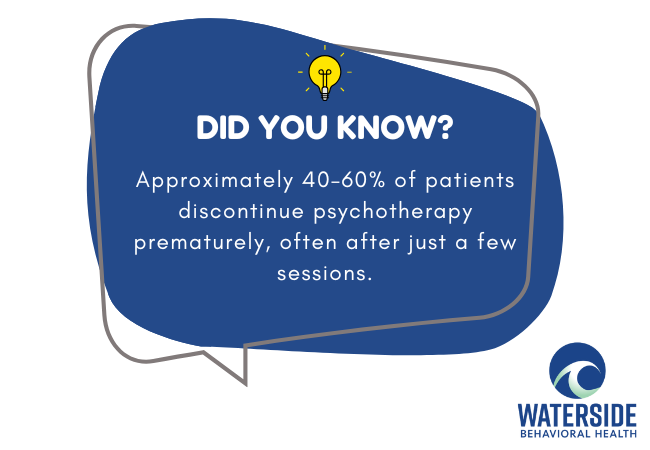When someone makes the decision to seek help for anxiety, one of the first questions they often ask is, “How long will this take?” It’s a reasonable concern—after all, anxiety can be disruptive to every aspect of life, and most people are eager for relief. But anxiety treatment is not a one-size-fits-all process. Instead, it’s a journey that varies based on the individual’s symptoms, underlying causes, therapeutic needs, and commitment to recovery. At Waterside Behavioral Health, we understand that timelines can vary, but so does progress—and with the right support, healing is possible.
Understanding the Nature of Anxiety Disorders
Anxiety isn’t just about feeling nervous before a big event. For many, it’s a chronic and overwhelming experience that affects sleep, relationships, productivity, and physical health. Generalized anxiety disorder (GAD), panic disorder, social anxiety disorder, and phobias are just a few examples of how anxiety can show up in a person’s life.
While some individuals experience anxiety as a result of acute stress or trauma, others may have genetic predispositions or long-standing patterns rooted in early development. This variation makes it important to tailor the length and type of treatment to the individual’s needs, rather than sticking to a fixed timeline.
Factors That Influence the Length of Treatment
There are several factors that play a role in how long someone may need therapy for anxiety, including:
-
Severity and Duration of Symptoms: Someone who has experienced low-grade anxiety for a few months may respond quickly to treatment, whereas someone with years of intense anxiety may need longer care.
-
Co-occurring Conditions: Anxiety often appears alongside depression, trauma, or substance use. If someone requires treatment for multiple issues, this can affect the overall duration.
-
Therapy Modality: The type of therapy being used, whether short-term or long-term, will influence how quickly progress is made.
-
Frequency of Sessions: Consistency in therapy matters. Weekly or twice-weekly sessions may yield quicker results than more sporadic appointments.
-
Client Participation: Motivation, openness, and commitment to homework or exercises outside of sessions can all impact the pace of recovery.
Common Treatment Timelines
There is no universal answer to how long anxiety treatment should last. However, here’s what the general timeline can look like across different therapeutic approaches:
-
Short-Term Therapy (6–12 weeks): Often focused on skill-building and coping strategies, this can be effective for mild to moderate anxiety.
-
Medium-Term Therapy (3–6 months): Useful when exploring contributing factors like relationships, thought patterns, or past trauma.
-
Long-Term Therapy (6 months–1+ year): For individuals with complex symptoms, co-occurring disorders, or long-standing emotional difficulties, extended therapy offers the depth needed for lasting change.
Treatment may evolve across time. A person might begin with structured sessions and then move into a maintenance phase with less frequent therapy as they gain more independence.
What Therapy for Anxiety Looks Like
Evidence-based treatment for anxiety typically involves talk therapy, coping skills development, and sometimes medication. The most commonly recommended therapeutic modalities for anxiety include:
Cognitive-Behavioral Therapy in Massachusetts is a highly effective treatment for anxiety. It focuses on identifying distorted thought patterns and challenging them through structured exercises. For instance, someone who assumes they’ll fail in every social setting may learn to question that belief and test alternative outcomes. CBT also emphasizes behavioral techniques like exposure, which helps reduce fear through gradual confrontation of anxiety-provoking situations.
Dialectical Behavior Therapy in Massachusetts is another useful approach, especially for individuals whose anxiety is accompanied by emotional dysregulation or impulsive behaviors. DBT integrates mindfulness, emotional regulation, and interpersonal effectiveness, which allows individuals to remain grounded during distress and respond more intentionally rather than reactively.
In addition to these, Trauma Therapy in Massachusetts is often necessary for those whose anxiety stems from unresolved trauma. Whether the trauma is acute or developmental, it creates a nervous system that’s constantly on high alert. Trauma-informed therapies help individuals feel safe in their bodies and environments again by addressing the root cause, not just the symptoms.
Group therapy, psychoeducation, and lifestyle changes like improved sleep, nutrition, and exercise routines are often part of a comprehensive anxiety treatment plan as well.
The Importance of a Personalized Approach
At Waterside Behavioral Health, we believe in meeting clients where they are. Anxiety treatment should never feel like a race or comparison. Every person brings a unique life story, and the right pace of therapy respects that. Some clients make significant progress in just a few months, while others need continued support as they build a strong foundation of emotional resilience. The point isn’t how fast—but how meaningful and sustainable the healing process becomes.
When clients engage in Mental Health Treatment Programs Massachusetts, they benefit from structured support, professional guidance, and a holistic view of recovery. Our clinicians understand the nuances of anxiety and craft treatment plans that align with the individual’s goals, lifestyle, and long-term wellness.
Measuring Progress Along the Way
Tracking progress is a vital part of effective therapy. This doesn’t only involve symptom reduction, but also measures like:
-
Decreased avoidance behaviors
-
Improved sleep or appetite
-
More engagement in social and professional settings
-
A stronger sense of self-awareness and emotional control
Sometimes, clients may feel like they’re not making progress until they pause and reflect on how far they’ve come. That’s why therapists at Waterside Behavioral Health incorporate both formal assessments and collaborative check-ins throughout the treatment journey.
Why Choose Waterside Behavioral Health?
Choosing the right treatment provider can make all the difference in a person’s recovery journey. At Waterside Behavioral Health, our care is rooted in compassion, clinical excellence, and a deep understanding of how anxiety affects every facet of life. We don’t believe in a “one-size-fits-all” approach—because healing isn’t formulaic. Instead, we recognize that each individual brings a complex set of experiences, strengths, and struggles, and we shape our care around that reality.
As a leading Mental Health Treatment Center in Massachusetts, our team consists of licensed clinicians, trauma-informed therapists, and compassionate support staff who are committed to helping clients build a sustainable path toward emotional well-being. We provide a full continuum of services that blend traditional therapeutic modalities with integrative strategies, so individuals can access care that supports both symptom relief and long-term growth.
Our programs are designed to meet clients where they are—whether that’s during a crisis, a transitional life phase, or after years of silently suffering. Our outpatient and intensive services allow clients to participate in therapy while maintaining their responsibilities at home, school, or work. By using evidence-based approaches, customizing treatment plans, and focusing on measurable progress, we aim to not just treat symptoms—but to support lasting transformation.
Waterside Behavioral Health fosters a space where clients feel seen, heard, and valued—not judged. That therapeutic alliance is key to growth, and our clinicians strive to earn trust every step of the way. From your first phone call to your final session, our goal is to help you feel confident, supported, and empowered in your healing.
Conclusion
There is no fixed timeline for overcoming anxiety—but there is a path forward. What matters most is that the journey is rooted in evidence-based care, supported by trusted professionals, and aligned with the unique needs of the individual. At Waterside Behavioral Health, we walk with you through every step, celebrating small victories and addressing setbacks with understanding and clinical skill.
Whether you’re just beginning to recognize your anxiety or have been navigating its impact for years, our team is here to help you reclaim your peace of mind. You don’t need to go through this alone—and you don’t have to wait until things get worse.
Reach out to us today at (774) 619-7750 to schedule a consultation or learn more about how our programs can support your recovery. Let today be the day you take that first brave step toward healing.
Frequently Asked Questions (FAQs)
How long does anxiety treatment typically last?
The duration of anxiety treatment varies based on individual needs, the severity of symptoms, and the treatment method used. On average, therapy may last from several weeks to several months, with some individuals continuing care for longer-term maintenance and growth.
What type of therapy works best for anxiety?
Evidence-based approaches such as cognitive-behavioral therapy (CBT) and dialectical behavior therapy (DBT) are widely used and effective in treating anxiety. The right therapy depends on the individual’s unique symptoms, background, and treatment goals.
Can anxiety be completely cured through therapy?
While therapy can significantly reduce symptoms and improve quality of life, anxiety may not be completely “cured” in every case. Instead, therapy equips individuals with tools to manage and respond to anxiety more effectively over time.
How do I know if therapy is working for me?
Progress can be measured through reduced symptoms, improved coping, better relationships, and increased daily functioning. Your therapist may also use tools or assessments to track your improvement over time.
Is outpatient therapy enough for treating severe anxiety?
Outpatient therapy can be effective for many, but those with severe symptoms may benefit from intensive outpatient or partial hospitalization programs. A licensed provider can help determine the most appropriate level of care based on your needs.





